
Canberra First Aid Training
Gungahlia First Aid
At Gungahlia First Aid, we love teaching at our home location because it allows us to offer something truly special — small, friendly classes in a warm and welcoming environment.
Our home-based setting creates a relaxed space where students can learn without the pressure of large group settings, and where questions, conversations, and hands-on practice feel more natural and personal.
Whether you're here for CPR, first aid, or advanced courses, you'll be treated like part of the Gungahlia family — not just another number. It’s this personal touch that makes our training so effective and enjoyable, and why our students keep coming
We offer a full suite of nationally recognised and
non-accredited first-aid training options, including:
HLTAID009 – Provide Cardiopulmonary Resuscitation
HLTAID011 – Provide First Aid
HLTAID012 – First Aid in an Education & Care Setting
HLTAID014 – Advanced First Aid
HLTAID015 – Provide Advanced Resuscitation
Low Voltage Rescue (UETDRMP007)
Non-accredited Baby and Child Awareness Workshops
And more!!!! send us an email about our combination courses
Why Choose Gungahlia First Aid for your training?
More than 9 years of training delivery
Expert trainers with real-world experience
Mobile training – we come to you!
Servicing the Canberra area
Small class sizes and a personalised learning experience
Fully nationally recognised training and certifications ID.
Are you looking for a small class in Canberra
With instruction and practical training in line with legal, workplace and community considerations, Australian Resuscitation Council guidelines and other Australian national peak clinical bodies, this first aid course teaches the skills and knowledge to recognise emergencies and provide immediate and effective first aid treatment to any person suffering a sudden illness or injury.
The first aid training course in Canberra covers assessing the casualty, providing safety, accessing emergency services, and using resources to provide first aid, such as CPR and using a defibrillator, administering an autoinjector for anaphylaxis, administering asthma medication, assisting someone who is choking, using appropriate immobilisation techniques for envenomation, fractures, dislocations, sprains, and strains, and managing casualties with non-life-threatening bleeding and shock.
You will learn basic anatomy and physiology, the differences between adults, children, and infants in CPR, the importance of the chain of survival, and the importance of reporting incident details in writing and verbal form. You will also review incidents to improve your skills and response times, recognise psychological impacts and seek help as required.


